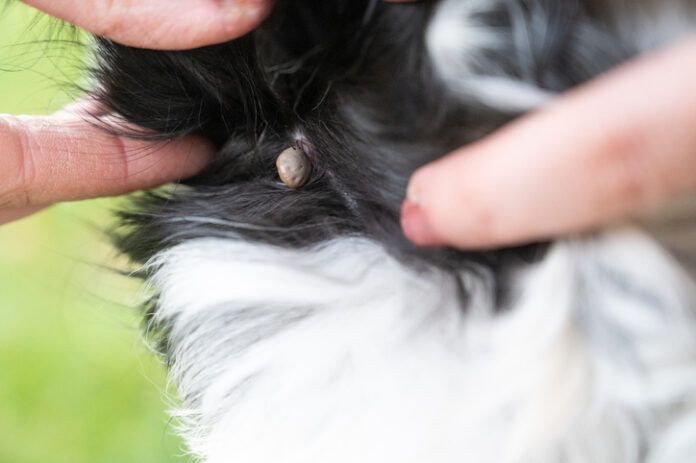I’m just back from a week’s vacation, wherein my husband and I picked up his grandson from a suburb of Boston and drove to Gettysburg National Military Park in Pennsylvania to indulge in said grandson’s fascination with the Civil War. We took a hike in Connecticut (on the way) and took several hikes all around the battlegrounds of Gettysburg, on wide, gravel trails and small, forested paths alike. One night in our hotel, after walking all over the hills and trails in Gettysburg, I felt something crawly and found a big dog tick walking along my forearm. Ack! I flushed the tick down the toilet and told my husband and grandson to be alert for ticks on themselves, too.
I honestly thought no more about it until this morning, when I read a 2021 article that a Pennsylvania friend had just shared about the detection of a new strain of Rikettsia, a potentially deadly disease affecting both dogs and people. The new strain of this tick-borne disease was first detected in a handful of dogs who either lived in or had recently visited southern states. I was not bitten by the tick, so I know I don’t have to be worried for myself, but any new tick-borne disease is bad news that dog owners in particular should be aware of.
Ticks can carry quite a few pathogens that can cause disease in dogs and humans. Some of these pathogens are viruses, some are bacteria, and some are protozoa (single-celled animals). Rikettsia are very small bacteria species that grow inside the living cells of their hosts. Different strains of Rikettsia are responsible for diseases such as Rocky Mountain Spotted Fever and various strains of typhus.
The new strain of Rikettsia has likely been around for a while, but researchers identified it as a novel species only in 2020, after obtaining laboratory samples from tests conducted on dogs who had been diagnosed in 2018 and 2019 with Rikettsial diseases and certain symptoms (fever and specific hematological abnormalities). Researchers obtained DNA gene sequences from canine blood specimens that were seroreactive for R. Rickettsia and found identically unique genetic markers in samples from three dogs who had been bitten by ticks in three different states (Tennessee, Arkansas, and Oklahoma). After extensive analysis, it was determined that these three dogs had been affected by identical and never-before identified strains of Rickettsia. Additionally, the new strain was found to be related to two strains of Rickettsia that affect humans (R. heilongjiangensis and R. massiliae). The researchers concluded that this unique Rickettsia species has clinical significance for dogs and potentially humans. The disease caused by this species, they warn, could be underdiagnosed and geographically widespread.
The good news is that this strain, like other Rikettsia species, can be successfully treated with the antibiotic doxycycline; sometimes, more than one course of treatment is required. However, this presumes prompt detection of the infection (via PCR test for Rikettsia). Sometimes, dog owners need to push for this testing, as TBDs are not always the first thing that comes to mind when vets are faced with the varied array of symptoms and biochemistry abnormalities that TBDs can cause. Sometimes, additional medications ar required to treat side effects. For example, one of the three dogs whose novel infections were first detected (a Boston Terrier who lived in Illinois, but apparently got bitten by an infected tick on a trip to Arkansas) was treated with doxycycline to treat his rickettsiosis, prednisone to treat potential immune-mediated component, omeprazole to prevent gastric ulcers (doxycycline can be notoriously hard on a dog’s digestive tract, causing many dogs to stop eating during treatment), and metronidazole to treat “assumed dysbiosis” (disruption to the microbiota homeostasis caused by an imbalance in the microflora, i.e., super upset gut balance caused by the doxycyline).
Some readers of WDJ have complained that we promote the use of topical pesticides that repel and/or kill ticks (such as this recent one that listed all of the better flea and tick preventatives currently on the market). In truth, we want dog owners to know as much as possible about the tools that are available, so they can choose appropriate tactics for protecting their dogs from fleas and ticks, based on their dogs’ individual health conditions and environment. We do not advocate for pesticide use on all dogs, but we do want owners to be aware of the risks of failing to adequately protect the dogs who are at high risk of parasites and the deadly diseases that they (ticks in particular) carry. Tick-borne diseases are widespread, varied, and, left undiagnosed or inadequately treated, capable of making humans and dogs alike very ill – even killing them. It’s critical to prevent your dog’s exposure to ticks – and to get your dog tested for tick-borne diseases if he develops any symptoms of lethargy, fever, lameness, or lack of appetite after being exposed to ticks.
References:
https://www.ncbi.nlm.nih.gov/pmc/articles/PMC7706976/






In my hometown (Tunkhannock, Pennsylvania) the black-legged ticks, more commonly known as a deer ticks, have tested positive for deer tick virus (DTV). I have yet to find anything that states whether or not canines are affected, and if so, how severely. This is very concerning!
My dog got Lyme disease from a deer tick bite in Maine. Fortunately he is not showing symptoms at the moment.
This article does not discuss treatment of this new strain which I find remiss.
You’re absolutely correct! Thanks for mentioning that! Adding that now. We’re fortunate in that it responds to doxycycline, the same antibiotic that works for many of the TBDs.
My son had Lyme several years ago. It went undiagnosed for 2 or 3 months while he and his doctor tried to figure out what was wrong with him. I asked if they checked for Lyme, since he had been bitten by ticks. They checked and got “lucky” that it showed up. However, 2 rounds of doxycycline did not clear it up. The AMA does not recognize chronic Lyme Disease, but it exists. My son had it. After months of trying to get treated, we finally found a doctor that specialized in Lyme Disease. The treatment, several weeks of intravenous antibiotics, caused a lot of problems as your body throws off the disease. If not caught quickly, Lyme causes arthritis and nerve damage.
What I am saying is, don’t mess around with ticks. Be aware if you get a bite. If you start running a fever, get checked! And, I know insecticides are not good for our persons, pets, or planet, but Lyme Disease is worse. Make your choice. Spray your yard or risk a loved one. But, do check for ticks!
If you spread Diatomaceous Earth over your yard it will kill ticks and fleas. It has to be the white DE from pool supplies. The powder has barbs that penetrate the insects outer shell that allows bacteria and fungus in that kills them. Apply DE over your yard when there will be a few dry days. That will give the insects a chance to walk through the powder. D E is for swimming pool filters. Apply again after rain and when the yard is dry. Rain washes it into the soil so it becomes useless. I’ve used it for 25 years. I use Advantix 2 also.
Most times you have good articles, but sometimes not so, like this one. If you’re going to talk about something, (like a tick), talk about it. Say what states it’s in, symptoms, any cure, etc., not your vacation.
Thanks for the feedback. If it helps, this one page (posted under the tab “Blog” at the top of the page) is my blog, where I do share more personal things about my dogs and my life with dogs as they come up. The posts on this page and my monthly editorial are the only pages where I might share details about things like ticks found on vacation. All the rest of our content are straight-up articles. Hope that helps.
Thank you I think all you post is fabulous and we appreciate the help most of us
Nancy, you”re very gracious.
JollyJim, huh? That’s an ironic nickname, isn’t it?
It’s a shame we’re living in a time in which we see pharmaceutical companies, supported by their captured agents in the government, working hard to create and fan the flames of fear with a seemingly endless string of discoveries of “new“ and “novel“ diseases. Coincidentally, they just happen to have pharmaceutical remedies for all of these. Thanks, but information such as this comes with great suspicion now.
Well said. We wonder who is behind the latest danger to both people and pets, in this case the tick borne outbreaks and subsequent diseases….hmmm….And has anyone seen and heard the recordings of representatives of the wef and its associated organizations, talking about how we need to be afraid of our pets? Did you catch a recent ”news” report that circulated nationally, regarding how we should stop cuddling our pets and cease allowing our pets to give us kisses?
Yes and thanks for reminding us about this. In fact there seems to be increasing reports on corporate-legacy media of ostensibly mean things regular pets are doing…as if to set a new baseline for the relationship with pets.
Yes indeed well said. And we need to support one another when we speak out about this.
We might add that these news strains coincidentlly start near labs. We will try to find the ”proof”, the anecdotal evidence, that we already read the past two weeks, and post here at a later date.
Finally, let us not forget to seek remedies that are Homeopathic, Naturopathic, Ayurvedic, Herbal, among other supplements. To keep these options, however, we must always be speaking to our governing bodies, agencies and representatives, to stop the attempts at banning of access to alternatives, which is regularly discussed at anh-usa.org
It must be a conspiracy by Big Pharma that is “creating” all these novel pathogens. Yup. That’s what it is!
And how suspicious that medicine would actually work! It’s all a scam!
We holistic purists would prefer that there be no treatment for our beloved pets. Just let me sit under a pyramid and rub crystals on my dog. Or better yet, let me use a magic potion that has been diluted several million fold and rely on the solution’s memory of the energy that has been imbued into it!
Well said, Scott. I appreciate your humor in response to “JOLLYJIM” (ha!) and the three conspiracy theorists. (I always appreciate and look forward to every one of Nancy’s articles (and very much appreciate when she shares some of her personal stories with us).) Nancy is wonderful.
JOLLYJIM needs to take a chill pill. Thank you for putting all this information in one spot.
Thanks for the heads-up about this new strain. I live in a rural area and have to check my dogs and myself for ticks daily, even during colder weather. I’m pretty sure the nasty buggers would survive a nuclear strike!
Don’t shoot the messenger for Pete’s sake!!!
My dog just had her annual 4DX which came back negative. I assume since this is a new disease, it would not be detected via the 4DX? Thanks for alerting us to this new disease.
There are blood (seroreactive) tests that look specifically for antibodies to any Rikettsia species; a PCR test (which looks for the DNA of any Rickettsia species) will also detect it.
The 4Dx test is a seroreactive test that can detect antibodies that indicate infection with heartworms, Borrelia burgdorferi (the bacteria that causes Lyme disease), Anaplasma phagocytophilum and Anaplasma platys (the bacteria that cause anaplasmosis), and Ehrlichia canis and Ehrlichia ewingii (the bacteria that cause ehrlichiosis). So a 4Dx test would NOT detect this infection. If a dog is displaying symptoms of any TBD and has been present in an area where ticks are known to be found, ask your vet for a blood test that specifically looks for antibodies to Rikettsia or a PCR test.
Thanks Nancy!
Guinea hens, chickens and OPossums all eat ticks so good to have in your yard if you are lucky.
Thank you for sharing this great information! My preferred method of tick disposal is transparent sticky tape (Scotch tape). It immobilizes the tick and then I toss it in the trash. I keep a roll in my garage and in my car’s glove compartment, ready for the tick check upon returning from our daily walks and hikes. More convenient than toilets, especially if they are none nearby. And I read that ticks can survive total submersion in water for hours without dying.
In the ’70s I got bit by a tick I was 17 years old it paralyzed my body for like 3 months those days I didn’t know what it was they were treating me like with Rocky mounted spotted fever but every joint in my body I could not move I couldn’t walk down the stairs it was a excruciating pain and then whatever they gave me which I don’t remember it took for a month for it to go away ..at that time it really scared my parents..so I believe it was from a tick..check your bodies
Just to comment that I really appreciate WDJ’s commitment to reviewing all choices in flea/tick prevention to readers. I’m lucky to be able to manage these parasites by herbal means for the most part…but I have traveled in SE USA where my dog was absolutely plagued by ticks. Herbals and my conventional means of managing them didn’t even made a dent, so I chose to use a chemical on a one-off basis which gave my dog some relief. I appreciated having WDJ to call upon as I considered the options.
I think everyone has to assess their personal risks for the pets and people in the household individually. Where we live in Oregon we have a lot of deer around our house (deer can carry ticks) but my husband keeps the grass well mowed, my dog and I avoid hiking trails (sadly due to bad encounters with all the off leash dogs) or tall grass and she is very short haired. So while I do occasionally check her for ticks I don’t use a topical preventative because I feel her risk of contracting a tick is low. Not impossible but low. As I said, I do check her. My point being again assess each situation and act as appropriate.
Thank heavens for rational people. There seem to be folks who do what they can without chemicals as long as they can but bend to practicalities when necessary. Thank you, Nancy for your heads up.
I have tried numerous natural tick repellants over the past two decades. Not one of them has worked effectively. Therefore, I use topical applications (pesticides) that I dread and feel bad about. But the alternative of having no practical tick defense is much worse in my personal opinion and situation.
We live in the South of France where Piroplasmosis is endemic in the tick population (I believe it’s called babesiosis in the U.S.) Ticks are a year-round problem here as we have a lot of wild life and there are large forests as well as fields with livestock. One of our dogs was bitten by a tick despite us having used a topical product at the time. He weighed 42 kg but overnight dropped at least 2 if not 3. It was terrifying to see how rapidly he went from being a large, powerful young dog to being close to death’s door. Luckily, we got him to a vet in time to save him, but it took several weeks before he was returned to full health. Since then, I’ve seen other dogs with Piroplasmosis, and know how rapid the progression of this killer disease can be.
Like many, I worry about using insecticides on and in my dogs. But the risk of Piroplasmosis is too great to take any chances. I’m grateful that we have effective tools at our disposal to fight these killer diseases that are becoming more and more common in regions where they were once unknown because of global climate change.
Thank you for sharing information and raising awareness!
It is appreciated.
Thanks for all the information and everyone’s thoughts. I have lived with dogs on 80 acres in rural Southern Illinois for 35 years. Ticks are a definite problem here and I have used the pharmaceuticals and the natural methods. Nothing works 100% so I have chosen to go natural with Bug Off Garlic. It works just as well as the topicals. My big problem now is that I have 2 dogs who wildly resist having a tick removed from their body. Any tips? And does anybody wonder why they come up with all these products for our dogs but not us humans?
When we first got our dog (rescue from southern Ohio kill shelter) she had a really high white blood cell count and got a blood test that came back positive for rocky mountain spotted fever. The vet said it must have been a mistake and her blood went to normal after antibiotics. When. she was 9 years old she got Immune Mediated Hemolytic Anemia. Could that be the result of this Rikettsia tick? She passed away after a couple of year and a lot of treatment that really didn’t help at all. But could she have been bitten by this tick somehow (we got her when she was about 6 months old). She had every test we could find and no one came up with any answers. We don’t use chemicals in the yard and hadn’t been out of Michigan. But possible she came in contact with the tick in southern Ohio.
We use a product from Springtime, Inc, called Bug Off Garlic. It says “A 24-hour shield against fleas, ticks, mosquitoes, gnats, etc.
• A safe alternative to harsh chemical products
• One of the world’s most powerful antioxidants
• Promotes friendly bacteria in the digestive tract
• Great source of dietary sulfur, including MSM
• Supports a healthy immune system
• Check out Bug Off Garlic Chewables for a chewable tablet version of this product
Product Summary
Veterinarians versed in natural alternatives use garlic in their private practices throughout the world. Although best known for its health protective properties, garlic has been used as an insect deterrent for centuries. Springtime’s air-dried garlic takes that benefit to a new level and is far safer than many chemical products. You may use Bug Off for Dogs with total confidence.”
Although our vet highly discourages us with this product, it is what we use.
Thanks for the info and please continue to include personal info on your life as I enjoy reading all that you have to say! I have responded in the past that I feel like I know you, just from being a subscriber since the beginning. Thanks for all that you do!